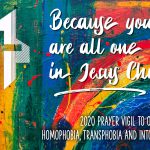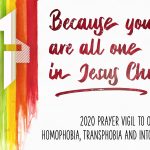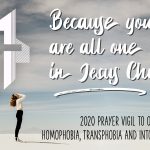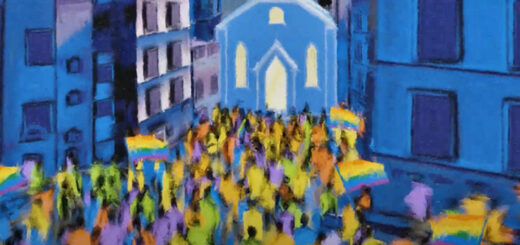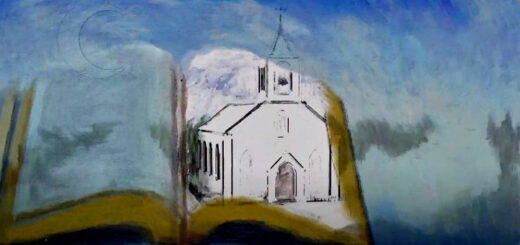On 17 May, Christian communities in Piacenza, Parma and Reggio Emilia (Italy) will meet online for a vigil on the IDAHOBIT 2020
- vigil2020
- vigil2020
- vigil2020
.
In future, we might look back on the timing of this year’s IDAHOBIT vigils with pain, because of the pandemic, and the associated suffering, deaths, sacrifice of first-line workers, and terrible effects on the economy and the workplace, as well as the great pain of those people – young and old – called to isolate, and finally the suspension of the communal life of all churches. Sometimes, worried voices have raised their objections to closing a church: as if a pause from the regular liturgy could really extinguish the need for God, and the grace that is poured out generously to satisfy this need.
Throughout the pandemic, LGBT people, together with their parents, families, friends and the pastoral carers who support them, have set up many online initiatives to pray, meditate and share, to try and escape from the loneliness, to build a community, to celebrate and to hope.
As Christians, we instantly understood that, regardless of isolation, we can pray; we can read and meditate the Word of God; we can ask for and receive forgiveness for our sins; we can be nourished by the presence of God; we can call and receive the Holy Spirit; we can, and must, entrust God with the suffering of ill people.
The loving presence of God is not limited by any restrictions: God is open and as generous now as before; God lives in our homes and in our heart. God nourishes, forgives, consoles, and enlightens. Through Jesus Christ, God became our friend forever. Christ is the only temple we need, and he is there for us. Because of this, we can worship the Father in spirit and in truth.
During this long period of fasting, it would be wrong to fear that we cannot access God’s grace just because we cannot go to church. God is accessible, present, and alive in us and in our homes, as well as in our phone calls; in the prayers of individuals and of the community, even if at distance; in the sleeping embrace of people who wake up with us; in the voice of our family on the phone.
We can experience this private dimension of faith, a love for God’s presence that goes beyond the lack of ministers, rituals and sacred items. We need them all to make God visible and concrete. God is invisible, but he is there.
We can experience this faith because we have learned from our experience as LGBT Christians to feel loved by God even without the rituals, because when the ‘scribes and pharisees’ excluded us, we had to learn to find God’s love outside the reassuring circle of ‘normal people’. If we look for God, we will find God, because God will find us first.
If we want to ask for God’s forgiveness, we can do it, for we are sure that God will give us the strength to be better. If we are hungry for God, we can pray and receive the strength we need. If we feel overwhelmed and scared, we can find reassurance in God’s embrace. It is not worthless, in these gloomy times. Nothing can set us apart from God’s love – that is the hope of the resurrection.
We are, then, grateful for our experience of exclusion, as we have discovered a liberating space that saves us, a freedom that we can give and share with everyone.
This is why we invite you all to pray with the Christian communities in Piacenza, Parma and Reggio Emilia (Italy) on 17 May. Come and drink at Jacob’s well, where Jesus, before he gave us the water of eternal life, is happy to drink our water from our wells, however muddy they might be, and where Jesus met the Samaritan woman, who stands for all who are outcast and excluded. She was a woman who probably had a complicated romantic life, but didn’t feel judged by Jesus. Like her, we recognise the one who was Sent by God, because her story is our story, and in her life a meaning emerges, through Jesus’s unparalleled sensitivity, trust and mercy.
The vigil will take place online, on Google Meet, on Sunday 17 May 2020, at 4pm CET. If you want to take part, please send an email to spiritualita.arcobaleno@gmail.com and you will receive a link to join.
Remember: God loves you as you are: as a human being created by God, you have dignity, and you will evidence your dignity by living your love. We wish you all the best.
Program:
First hymn: Jesus and the Samaritan woman.
Introduction by Franciscan sister E. Solmi
First testimony: the pain of being excluded
Second testimony: the comfort of feeling welcome
Gospel reading: Jesus and the Samaritan (John 4, 1-29), read by Noemi Falla, Methodist Church in Parma
Reflection by Fr Guerrino Franzoni (from Bagnolo in Piano)
Music: Gabrile’s oboe (E. Morricone)
Prayers
Lord’s prayer
Finally blessing (community of Piacenza)
Website> https://inveglia.wordpress.com/category/english/

